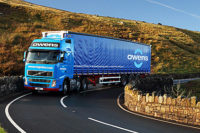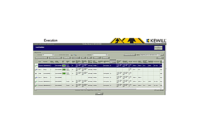With growth comes the challenge to maintain and improve service while shipping larger volumes from the same physical space. For Ace Endico, a growing regional foodservice distributor based in Brewster, N.Y., the key was to pick more cases in the same number of hours and load trucks more efficiently, so drivers could leave on time to meet delivery targets and customer service levels. But, the company’s previous order selection process using wearable computers and barcode scanners made a hard job even harder, especially in the face of the growth demands, according to Rob Johnson, night warehouse manager for Ace Endico.
“There was a high level of frustration with the RF system,” says Johnson. “New people had trouble adapting to it, and in retrospect, we were asking them to adapt to a system that was cumbersome. There were also issues due to bad barcodes and scanner troubles. It really slowed them down.”
While the scanning solution helped Ace Endico achieve high levels of selection accuracy, the executives and managers wanted more.
“The main things we needed were better productivity and accuracy and an easier, faster way to get new employees up to standard,” says Murray Hertzberg, president of Ace Endico. “Better selection accuracy helps us eliminate re-ships, which reduces our shipping costs. And, since we are growing, we needed to be able to select orders more efficiently.”
Case in point: A voice-directed selection system would address the accuracy, productivity and training challenges and improve worker safety.
Selection and implementation
During their research on voice technology, Ace Endico contacted Lucas Systems, a Wexford, Pa.-based provider of mobile work execution systems. Lucas Systems incorporated best practices developed over hundreds of voice implementations into a new foodservice-specific voice solution called Jennifer FoodSelect.
Jennifer FoodSelect includes configurable voice-directed selection, a QC/audit application, powerful management tools, the Engage Management Services Console and the voice-directed software that runs on rugged multi-modal hardware devices used in freezers, coolers and dry areas. The Jennifer FoodSelect system integrates with Ace Endico’s current back-end ERP system.
How it works—eyes- and hands-free picking
Ace Endico’s previous RF-based selection system used wearable computers with ring scanners and pre-printed case labels. Selectors would read the labels or computer screen to determine what items and quantities to pick. They would then scan each case they picked, or if the product did not have a barcode, key in the quantity using the wearable computer and place the appropriate label on each case. They would also scan or key-enter catchweight information as well as lot or date information, if required.
The voice-directed process with Jennifer FoodSelect eliminated the need to read labels or screens, and replaced scanning and manual key-entry of additional data with spoken commands.
“We are still using labels for the benefit of the drivers, but the men are picking cases without reading the labels, so they are listening to the commands with their heads up, which is more efficient and also much safer,” says Hertzberg.
Rather than scanning or keying in information, selectors confirm by voice that they are at the correct location and picking the right quantities. When selectors arrive at each pick location, they speak three digits of a 5-digit code (or check string) that is printed on a label at the rack location.
“We have had no issues with voicing check strings and no mechanical issues with the devices,” says Johnson.
The system includes variable check digits, so that managers can change which three of the five numbers (first three, last three, middle three, etc.) users need to speak in order to confirm their locations. This helps prevent selectors from memorizing the numbers.
Speaking the quantity picked is easier and more efficient than scanning or manual entry, says Johnson. Likewise, selectors can scan or voice-enter catchweights and speak date and lot numbers, which is more accurate and efficient than key entry on a wearable terminal. In and of itself, voice direction and speech recognition makes the job easier and more efficient for selectors. In addition to the inherent advantages of the voice-directed process over RF-based order selection, Jennifer FoodSelect provides a more efficient workflow that drives additional productivity gains.
Eliminating non-productive time
With the previous scan-based process, Ace Endico’s selectors could pick two orders in a single trip through the warehouse by grabbing two strips of case labels. Selectors manually managed the two strips of labels to be sure they were using the right labels, adding time to every pick. The issue was even more pronounced in the narrow-aisle planned inventory reserve (PIR) sections of the warehouse in which selectors could pick several orders at a time using man-up trucks.
With the new voice system, Jennifer FoodSelect automatically merges the picks for more than one assignment into an optimal pick sequence, and prints the labels for all of the orders in pick sequence in a single strip. Jennifer FoodSelect tells selectors which location is next, and selectors can periodically check that they are using the correct label by asking Jennifer the current label number. Jennifer FoodSelect also directs the selector to put each case on the correct pallet, helping to avoid other shipping errors. Besides speeding up the selection process, Jennifer FoodSelect also improved the efficiency of the PIR merge process because items picked in the PIR aisles are merged onto order pallets picked in the other aisles.
Ace Endico made other changes in the selection process to further reduce travel and eliminate non-productive time for selectors. For example, as part of the prior scan-based process, staff in the shipping office would print and assemble packets of labels that were printed by the ERP system. Selectors would have to pick up their case labels at the shipping office between every assignment. With Jennifer FoodSelect, the case labels are printed on printers situated on the warehouse floor.
“The selectors don’t have to come to the office to talk to the clerk, and that’s a few minutes saved per assignment,” says Johnson. “Now, the selectors stay out on the floor and the clerk has more time to do other things. A lot of the indirect time has gone away.”
Improved training, ease of use and management reporting
“New people had trouble adapting to the old system, but now they have a tool that is easy to learn,” says Johnson. “It helps them rather than hinders them. With the RF system, it would take two weeks before we would let someone go out and pick on their own. With Jennifer, they are picking on their own within 1-2 days.”
He adds that it would take new selectors as long as 90 days to hit pick rates of 110-120 cases per hour, the targeted minimum productivity rate.
“With Jennifer, they can focus on picking and putting the items on the pallet, and within weeks, they are able to meet our productivity standards,” he adds.
Other built-in functions ensure selectors are following special customer requirements. For instance, Jennifer FoodSelect will provide a “heads-up? message to selectors when a customer doesn’t want labels on their products.
“That’s a customer service issue,” says Johnson. “Before, the guys just had to know and remember it, but with Jennifer, she reminds them while they are picking.”
Jennifer FoodSelect also provides a suite of web-based management tools, such as the Engage Management Services Console (MSC), which tracks and manages operations throughout the work day. Using Engage, managers can see at a glance the status of picking across loads.
“We can see how much is left in each department and move workers from one area to another, so all areas finish up at the same time,” says Johnson. “As a result, our dock isn’t getting as jammed up. It has allowed us to become more of a flow-through operation.”
In addition, the productivity module in Engage provides real-time tracking of selector productivity and indirect time. As a result, managers can share productivity information with selectors throughout the shift. Previously, managers could only calculate productivity after the fact.
“The selectors can check their current productivity rates when they go on break, so they can see how they are doing,” says Johnson. “There is a real competition to beat the number and a real sense of camaraderie and motivation to do even better.”
Adding voice in loading and replenishment
Ace Endico also uses Jennifer FoodSelect for truck loading and replenishment. The loading module helps eliminate loading errors and improves efficiency and safety since workers no longer need to look away to read terminal screens. The loading teams are “more productive and more accountable,” says Johnson. In addition, the loading module helps Ace Endico track other assets sent out on the delivery trucks such as pallets for back hauls or products being returned to vendors.
The replenishment module has been “phenomenal,” says Johnson. Previously, let-own workers didn’t always fill slots to maximum, so the night shift spent an average of 10-14 hours per night doing let-downs to fill shorts. Order selectors also spent more time picking from reserve locations, which impacted productivity. Likewise, managers and clerks spent hours investigating and correcting “drops.”
Within two weeks of rolling out the replenishment module, Johnson says the forward-picking slots were filled to capacity, reducing shorts and helping the night team as a whole do their jobs more efficiently.
“The drop report used to be more than 10 pages long,” he says. “Now, it is more like 1.5 pages, most due to other issues, not replenishment.”
Today, a single worker on the night turn spends about three hours per shift filling shorts, compared to more than 10 hours before.
“This also reduces the time we spend investigating issues,” adds Johnson. “I have more time to do other things, the assistant manager can spend more time on the floor and our clerk has more time to do audits.”
Ultimately, Jennifer FoodSelect resolves customer service issues—order selectors don’t spend time doing let-downs or picking from reserve, so they can pick orders more efficiently and get the work done earlier, ensuring trucks leave the dock on time.
Results
According to Hertzberg and Johnson, Jennifer FoodSelect delivered immediate improvements in productivity and accuracy.
“Our case picking rates were about 135-145 cases per hour in the old system, and now it is about 180, which is a greater than 25% increase in productivity,” says Hertzberg.
In addition, selection errors were reduced by 44% within months of implementation, and the selectors are setting new records for perfect accuracy, including some who are picking for multiple months with no errors.
“We have improved the productivity and quality of life for selectors,” Hertzberg adds. “Since selectors are paid on an incentive basis, their pay packages have increased dramatically. It’s a real win-win. The workers get bigger paychecks, and we get higher volumes shipped with the same number of people.”
The efficiency improvements with Jennifer FoodSelect have also allowed Ace Endico to switch from a 5-day work week to a 4-day, 10-hour schedule.
“We have been trying to move to a 4-by-10 schedule for a long time, which is something that the men have really embraced,” adds Johnson. “Night crew morale is also much better. They realize we are giving them a tool to dramatically make their workload easier, as compared to before, where there was a high level of frustration with the RF system.”
Improved morale also translated into reduced staff turnover.
“We used to turn over 100% of our staff every year, but it has decreased dramatically since we installed Jennifer,” says Hertzberg. “So, now we’ve had 12 months of strong growth with no operational issues. We are handling increased case volumes and we have reduced overall hours worked, improved our levels of service and also enhanced safety for our workers.”



